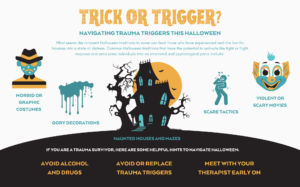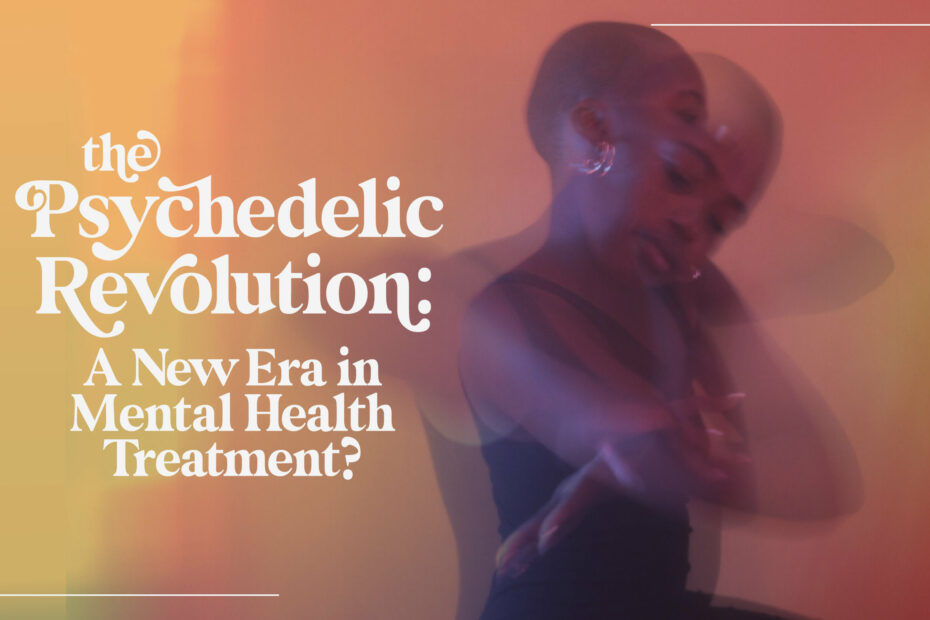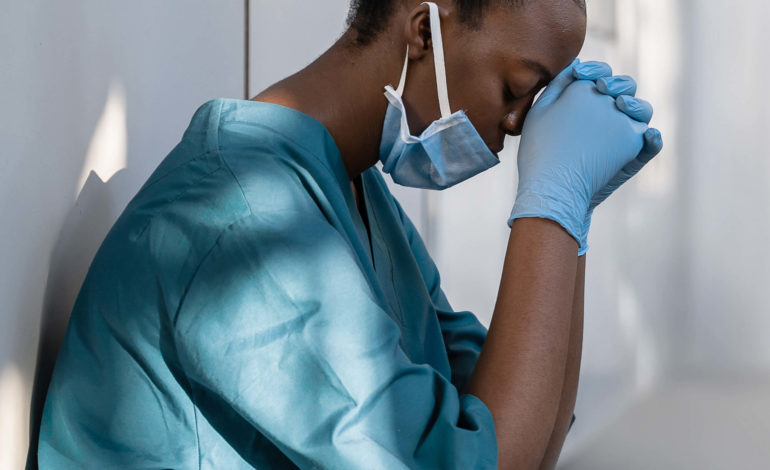Fall is in full swing with the leaves changing, the temperatures dropping, pumpkin spice everything, and Halloween. Although Halloween is considered a fun-filled holiday for most people as it includes costumes, candy, parties, and decorations, it can be a triggering holiday for those with past traumatic experiences.
There is an underlying scare tactic to Halloween that often includes scary costumes, horror movies, haunted houses, graphic decorations, and unwanted physical contact (people jumping out and scaring you) that can be incredibly triggering for some. Individuals with anxiety, past traumatic experiences, or those with PTSD may find that Halloween causes a cascade of traumatic stress symptoms such as panic, fear, flashbacks, nightmares, and distress.
Who might be affected by triggers during Halloween?
You do not need to be the victim of a devastating wildfire, part of a gang or cult, or engage in battlefield combat to experience trauma. Of course, trauma has deep roots in these events, as well as violent attacks, sexual assaults, car accidents, and other natural disasters, but trauma can also be quiet and elusive. Trauma can stem from more subtle life experiences such as rejection, neglect, discrimination and prejudice, insecure or unhealthy parent-childhood attachment, and bullying and shaming behaviors.
Some types of trauma can have long-lasting negative impacts on certain individuals and can leave them with many life-impairing thoughts and emotions. In some individuals who have PTSD, the neural connections become mixed up, and the brain has a difficult time differentiating between real or perceived threats, constantly putting the individual in a primal fight or flight situation. What seems like innocent Halloween traditions to some can lead those who have experienced real-life horrific traumas into a state of distress.
Common Halloween traditions that have the potential to activate the fight or flight response and send some individuals into an emotional and psychological panic include:
- Morbid or graphic costumes
- Violent or scary movies
- Haunted houses and mazes
- Gory decorations
- Scare tactics, such as people jumping out unexpectedly

If you are a trauma survivor, here are some helpful hints to navigate Halloween:
Utilize your support system: Seek out friends and family who don’t celebrate Halloween or do not have trick-or-treaters and spend the evening with them. If you feel left out about not attending Halloween parties, surround yourself with others who will support you. You can still participate in fall activities such as leaf-peeping trips, pumpkin carving, baking fall cookies, apple picking, and fall crafts and baking without having to partake in Halloween activities.
Explain to your support system why you choose not to engage in Halloween activities (on a level which you feel comfortable without being triggered) so they have an understanding of where you are coming from and support you in ways they know how.
Avoid alcohol and drugs: Avoid self-medicating with drugs and alcohol as a way to navigate through this Halloween season. These substances are temporary bandages and can worsen trauma systems and anxious reactions.
Avoid or replace trauma triggers: Instead of watching scary movies, watch a comedy and avoid places and people that may trigger you this time of year. That could mean avoiding the Halloween aisle in grocery stores, storefronts, or restaurants with triggering decorations. Engage in exercise, cooking, baking, or other creative outlets that bring you joy. Maybe dive deep into a work project or home improvement chore.
Meet with your therapist early on: Many individuals who are triggered by Halloween may wait to see their therapist after the fact. For example, they may have had a traumatic experience at a costume party and feel the need to speak with their therapist. Try to meet with your therapist or a trauma support group before the week of Halloween so you can talk about any concerns or potential triggers that you may have or that may arise.
How to be a support ally during Halloween
Although you may or may not have friends who have experienced traumatic situations, you can still be a support ally for your community, as you never know who can be triggered.
- Avoid putting up gory decorations or wearing scary costumes; instead, wear something fun and decorate with pumpkins or other fall decorations.
- Avoid playing practical jokes, jumping out at, or touching people you do not know well or have not gotten consent from. This can be terrifying for anyone, but for individuals who have survived trauma, an unexpected situation like this may lead to increased traumatic stress symptoms.
- Be a safe presence for trauma survivors this Halloween. Remind them that they are not alone and that they are safe. Allow the survivor to tell you what is healthy for them and support them in doing those things.
Be aware that not everyone finds Halloween fun and enjoyable. For some, it can be re-triggering, elicit panic, and be anxiety-provoking. May we all be a safe place for trauma survivors this Halloween.



